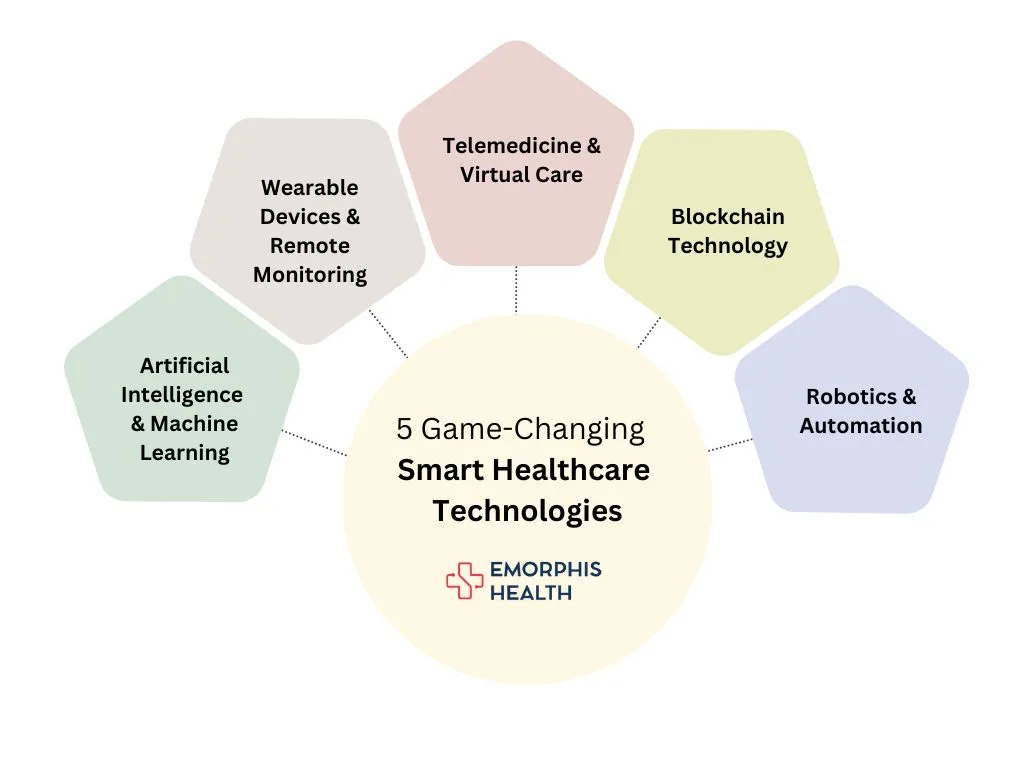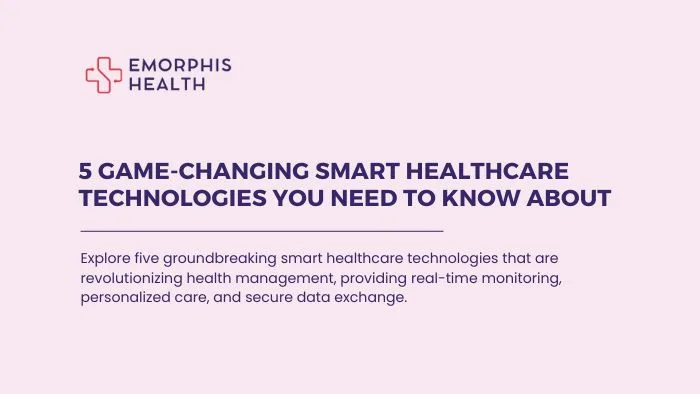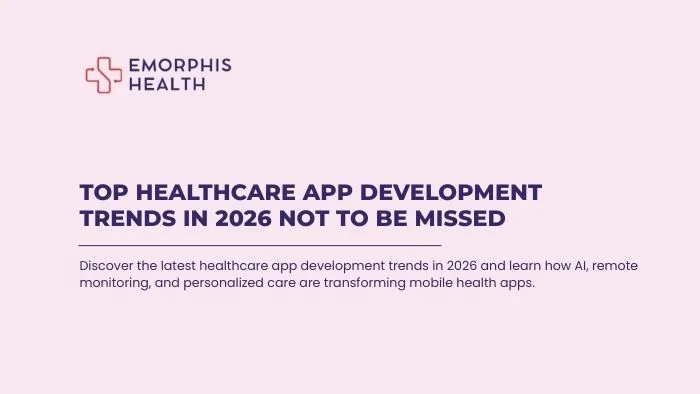Overview
See Contents
In a world where your watch can nag you into exercising and your phone knows more about your health than your doctor, it’s clear: smart healthcare is not just a sci-fi dream, but our present-day reality. Gone are the days of waiting hours in a clinic just to have a quick chat with your doctor. Now, your health check-up can happen in your living room, with your pet as a witness.
Defining Smart healthcare refers to using advanced technologies and innovative solutions to improve healthcare delivery’s efficiency, effectiveness, and quality. It encompasses many tools and systems, including artificial intelligence (AI), machine learning, wearable devices, telemedicine, blockchain, and robotics, among others.
These technologies enable real-time monitoring, personalized treatment plans, secure data exchange, and automated processes, ultimately enhancing patient outcomes and making healthcare more accessible and patient-centric.
Smart healthcare aims to create a seamless, interconnected healthcare ecosystem that leverages data and technology to optimize health management and care delivery.
In this article, we’ll explore five game-changing smart healthcare technologies you need to know about.
1. Artificial Intelligence and Machine Learning
Artificial Intelligence (AI) and Machine Learning (ML) are at the forefront of smart healthcare, revolutionizing various aspects of medical practice. AI in healthcare is revolutionizing the medical field by providing advanced diagnostic tools, personalized treatment plans, and predictive analytics to improve patient outcomes and streamline care processes.
- Predictive Analytics: AI algorithms analyze vast amounts of data to predict patient outcomes, identify potential health risks, and recommend preventive measures. For instance, predictive models can forecast the likelihood of readmissions, enabling healthcare providers to take proactive steps to reduce them.
- Personalized Treatment Plans: AI-driven systems can process and analyze patient data to create personalized treatment plans. By considering individual patient histories, genetic information, and lifestyle factors, AI helps in designing therapies that are more effective and tailored to each patient’s needs.
- Medical Imaging: AI-powered image recognition tools enhance the accuracy of diagnosing diseases through medical imaging. For example, AI algorithms can detect anomalies in X-rays, MRIs, and CT scans with higher precision, aiding radiologists in identifying conditions like tumors and fractures more accurately and swiftly.
2. Wearable Devices and Remote Monitoring
Wearable devices have become a cornerstone of smart healthcare, providing continuous monitoring of vital signs and health metrics. These devices provide real-time data, enabling patients and healthcare providers to stay informed about health conditions and take timely action.
- Smartwatches and Fitness Trackers: With the rise of digital health trends, fitness app development is becoming a crucial focus for developers aiming to create innovative solutions that help users achieve their wellness goals. These devices monitor heart rate, sleep patterns, physical activity, and more. They help in managing chronic conditions like diabetes and hypertension by providing insights into daily habits and suggesting lifestyle changes.
- Remote Monitoring Systems: For patients with chronic illnesses, remote monitoring devices can track vital signs such as blood pressure, glucose levels, and oxygen saturation. This data is transmitted to healthcare providers, allowing for continuous monitoring and early detection of potential issues, reducing the need for frequent hospital visits. Find details of Remote patient monitoring software development.
- Emergency Alerts: Wearables equipped with fall detection and emergency alert features can automatically notify caregivers or medical personnel in case of an accident, ensuring prompt assistance for elderly or vulnerable patients.
3. Telemedicine and Virtual Care
Telemedicine app development has surged, especially in response to the COVID-19 pandemic. This smart healthcare technology allows patients to receive medical consultations and treatments without the need for physical visits to healthcare facilities.
- Virtual Consultations: Patients can consult with doctors via video calls, reducing the need for in-person visits. This is especially advantageous for individuals in remote areas or those with mobility challenges. Virtual consultations also help in managing follow-up appointments and ongoing care for chronic conditions.
- Telehealth Platforms: Comprehensive telehealth platforms integrate various services, including appointment scheduling, electronic health records (EHRs), and remote monitoring. These platforms ensure seamless communication between patients and healthcare providers, enhancing the overall efficiency of medical services.
- Mental Health Services: Telemedicine has expanded access to mental health services, providing remote counseling and therapy sessions. This has been crucial in addressing the mental health challenges exacerbated by the pandemic and improving overall well-being.


4. Blockchain Technology
Blockchain technology, known for its security and transparency, is making inroads into smart healthcare, addressing critical issues like data privacy, interoperability, and fraud prevention.
- Secure Data Exchange: Blockchain ensures secure and transparent data exchange between healthcare providers, patients, and other stakeholders. Additionally, this technology facilitates the creation of tamper-proof medical records, ensuring data integrity and patient privacy.
- Interoperability: One of the significant challenges in healthcare is the lack healthcare interoperability between different systems. Blockchain facilitates seamless data sharing across various platforms and institutions, improving the coordination and quality of care.
- Fraud Prevention: Blockchain’s immutable ledger helps in preventing fraudulent activities, such as insurance claims fraud and counterfeit medications. By providing a transparent and verifiable record of transactions, blockchain enhances trust and accountability in the healthcare system.
5. Robotics and Automation
Robotics and automation are transforming surgical procedures, rehabilitation, and administrative tasks in healthcare, making them more efficient and precise.
- Surgical Robots: Robotic-assisted surgeries allow for minimally invasive procedures with higher precision and control. Surgeons can perform complex operations through small incisions, resulting in faster recovery times and reduced risk of complications.
- Rehabilitation Robots: Robotics are used in physical therapy and rehabilitation to assist patients in regaining mobility and strength. These robots provide consistent and precise movements, enhancing the effectiveness of rehabilitation exercises.
- Automation in Administrative Tasks: Automation enhances efficiency by streamlining processes such as appointment scheduling, billing, and claims processing. By reducing the burden of manual paperwork, healthcare providers can focus more on patient care and improve operational efficiency.
Conclusion
The integration of smart technologies in healthcare is driving a paradigm shift towards more efficient, accurate, and patient-centric care. From AI and wearable devices to telemedicine, blockchain, and robotics, these game-changing technologies are transforming the way healthcare is delivered and managed. Embracing these advancements in smart healthcare not only improves patient outcomes but also enhances the overall quality and efficiency of medical services.
As the healthcare industry continues to evolve, staying informed about these smart healthcare technologies is crucial for both patients and providers. By leveraging the potential of these innovations, we can look forward to a future where healthcare is smarter, more accessible, and more effective than ever before.
If you’re curious about how cutting-edge technology can revolutionize your healthcare practice, connect with Emorphis Health software and app development experts. They can provide detailed insights into how advancements in smart healthcare technologies, such as those outlined in our exploration of the five game-changing innovations, can be tailored to enhance your healthcare solutions and drive better patient outcomes.







